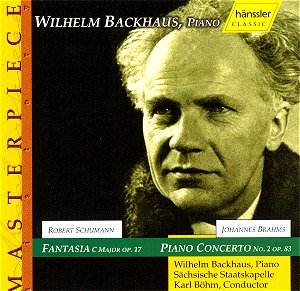This CD presents two
vintage performances by the German pianist,
Wilhelm Backhaus (1884-1969). In the
concerto he benefits from sterling support
from Karl Böhm. The recordings,
though over sixty years old, have come
up excellently and I was particularly
astonished at the amount of orchestral
detail that registers. The transfers
to CD have been well managed with little
evidence of surface noise. As is usual
with this series there are no booklet
notes but notes can be downloaded from
Hänssler’s website (www.haensler-classic.de),
which I always feel is a poor and inconvenient
alternative.
Near the start of the
first movement of the concerto, in the
passage between bars 146 and 174 (track
1, from 6’09") there were several
wrong notes and, indeed, Backhaus is
rather splashy in this passage. I feared
this might be an account of the concerto
spoiled by inaccuracies. However, these
fears proved groundless. Don’t be put
off by this fallible passage because
generally Backhaus is well in command
of the solo part. As I indicated earlier,
Böhm is a fine accompanist. He
keeps a firm yet flexible hand on the
proceedings and secures good playing
from the orchestra.
Backhaus plays the
second movement with power where appropriate.
However, what he mainly emphasizes is
the lyric side of the music and this,
I’m sure, is right. The opening of the
slow movement is distinguished by an
eloquent cello solo of mahogany tone.
Böhm shapes the orchestral introduction
masterfully and, when he enters, Backhaus
responds sensitively. The più
allegro (track 3, 6’29"), which
prepares the way for the reprise of
the cello solo, has a beautiful nocturnal
glow.
I wouldn’t describe
the account of the finale that is provided
here by Backhaus and Böhm as unbuttoned.
In fact it’s rather serious and straight-faced
but it is well played nonetheless and
rounds off a very good account of the
concerto. This performance would certainly
not dislodge in my affections the classic
accounts either by Gilels (either with
Jochum on DG or his earlier traversal
with Reiner for RCA, if you can find
a copy) or by Solomon (Testament) but
it’s still a commendable reading which
admirers of Backhaus will want to hear.
The generous coupling
is an account of one of Schumann’s greatest
achievements in the genre of solo piano
music. Backhaus’s performance of the
C major Fantasia is one that commands
attention throughout. By turns he plays
with nobility and poetry, as the music
demands. This is a notable performance,
one that is especially satisfying in
the spacious andante sostenuto
with which the work ends.
This is a very interesting
disc, which is well worth considering
at the modest price asked by Hänssler
– but I do wish they’d provide the notes
in the booklet and include in them some
information about the soloist, placing
these performances in the context of
the career of this distinguished pianist.
John Quinn
